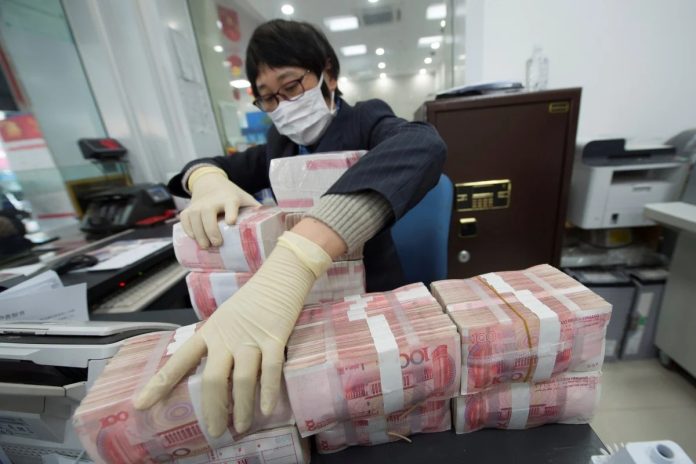China’s most vibrant banks reported the largest salary cuts among financial institutions last year, adding to ongoing employment pressures, while 10 state-controlled lenders also demanded employees return bonuses amid Beijing’s efforts to reshape the industry, according to data gathered from annual reports.
The large pay cuts came as the 12 national joint-stock banks – lenders that are owned and controlled by shareholders – are increasingly haunted by the debt woes in the property market and at local government financing vehicles.
And while such moves by the group’s members, which have assets only smaller than the big six state-owned banks, partly reflects China’s overall economic slowdown, more pay cuts are expected.
Bohai Bank, which is based in the debt-ridden northern municipality of Tianjin, reported the largest pay cut of 11.8 per cent to an average annual salary of 438,000 yuan (US$60,621) per employee.
It was followed by an 8.5 per cent cut by Ping An Bank and 6 per cent cuts from China Merchants Bank and China Citic Bank.
Industrial Bank registered a cut of 3.3 per cent, while China Everbright Bank reported a cut of 3 per cent.
The data was retrieved from human capital expenditure figures, which were included in annual financial reports.
The figures also include welfare and other items, but it is widely used in China as a proxy to show salary trends.
Meanwhile, 10 financial institutions – including state-owned banks, joint-stock lenders, as well as commercial and rural commercial banks – also revealed they demanded employees return performance-based bonuses worth a combined 99.88 million yuan (US$13.8 million) in 2023, compared to only three in 2022.
China Merchants Bank ordered 4,415 employees to return a total of 43.3 million yuan.
Bank of China made similar requests to 2,059 employees, while 499 employees at Bohai Bank were also asked to return bonuses, according to bank filings.
“Almost all employees in the industry have experienced salary cuts in the past few years. Now, the ratio of actual wages to payable wages is around 60 per cent.” said a Guangzhou-based banker, who asked not to be identified due to the sensitivity of the issue.
“For example, an ordinary employee who has worked at an ICBC branch for 20 years gets about 200,000 yuan a year, which is far less than before the [coronavirus].
“Even so, the competition is still fierce. In the asset custody department where I work, the new colleagues all graduated from world-renowned universities, and their income is about 6,000 yuan [per month] after tax.”
Beijing has targeted creating more than 12 million new jobs in urban areas this year, having said it created 12.44 million last year.
But a record 11.79 million university students are set to graduate this year, which is expected to compound the employment woes.
China’s adjusted youth-unemployment rate for the 16-24 age group excluding students reached 15.3 per cent in February, up from 14.6 per cent in January.
ICBC, China’s largest in terms of assets, and fellow big-six member China Construction Bank reported a 2 per cent fall in human capital expenditure last year.
Meanwhile, managers at several banks, including China Merchants Bank, Citic Bank, China Zheshang Bank, and China Minsheng Bank, have seen maximum pay cuts of over 60 per cent, said STCN, a news portal under the state-owned Securities Times newspaper.
Beijing is seeking to build “a modern corporate system with Chinese characteristics” as part of President Xi Jinping’s financial superpower ambition, meaning banks are faced with a list of rules.
China’s banking regulator initiated a mechanism of pay deferral and clawback to deter and monitor senior executives and employees in positions of responsibility since 2021, which included staff who had resigned or retired.
Banks accounted for around 90 per cent of China’s 461 trillion yuan financial industry last year, with a vast majority controlled by the government of different levels.

































